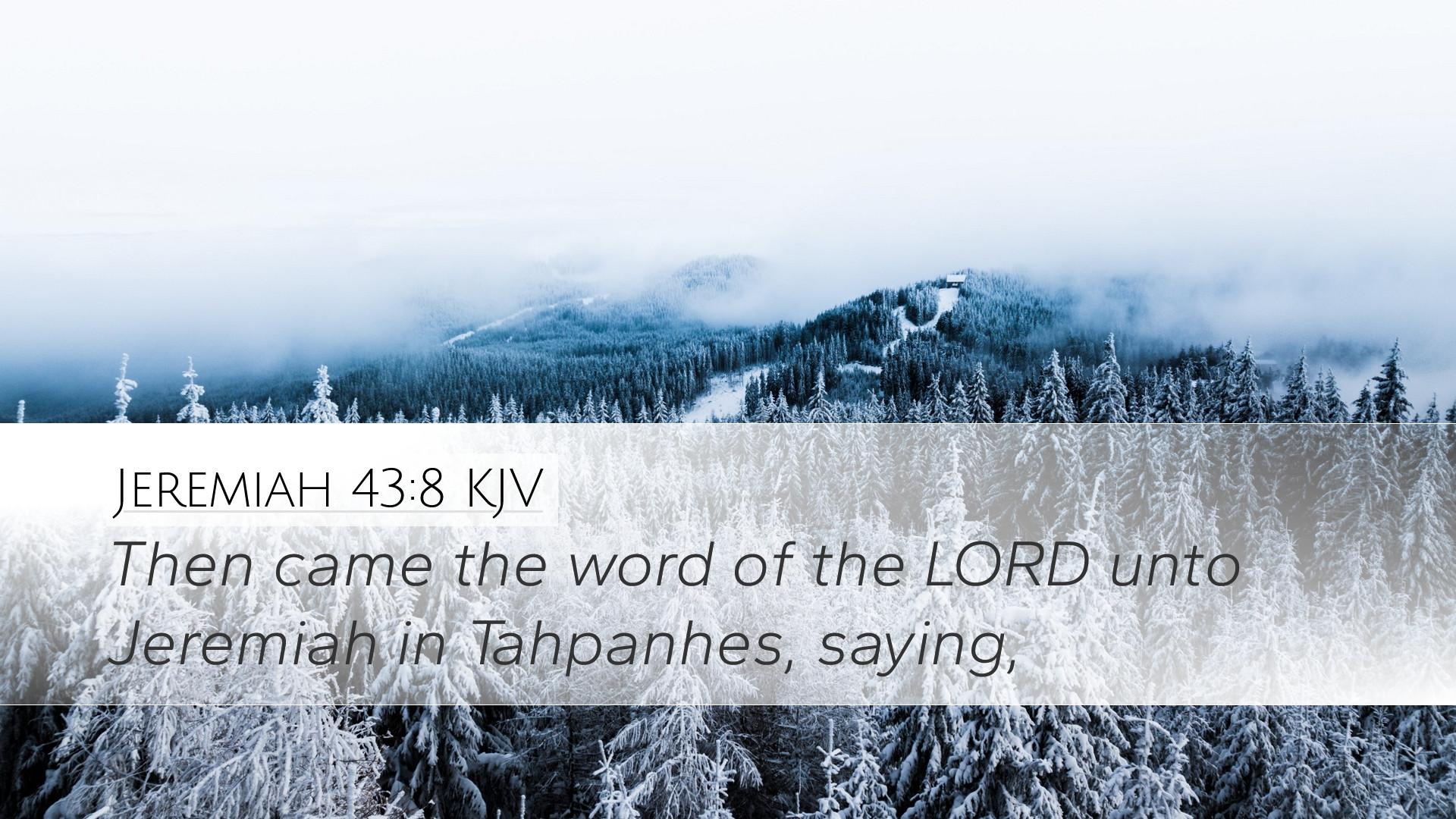Commentary on Jeremiah 43:8
Jeremiah 43:8 reads: "Then came the word of the LORD unto Jeremiah in Tahpanhes, saying,". This verse occurs in the broader context of Jeremiah's prophetic ministry and the tumultuous events following the fall of Jerusalem. The verse captures a critical moment where God continues to communicate with His prophet amidst chaos and uncertainty.
Contextual Background
To fully comprehend this verse, it is essential to understand the historical backdrop of Jeremiah's ministry. Jeremiah, often referred to as the 'weeping prophet', was active during the final years of Judah before its destruction. His prophecies warned of impending judgments due to the people's disobedience and idolatry.
Following the Babylonian conquest, many Jews fled to Egypt for refuge, where Jeremiah found himself in Tahpanhes—a city in Egypt. This setting illustrates the desperation of the remnants of Judah, highlighting themes of fear, disobedience, and a longing for security amidst foreign lands.
Insights from Public Domain Commentaries
Matthew Henry's Commentary
Matthew Henry in his commentary stresses the significance of God's persistent revelation. He notes that even in a foreign land where the people of Judah sought refuge, God remained close to His prophet. This divine communication underscores God's sovereignty and the importance of prophetic ministry. Henry highlights that God's word came to Jeremiah "in Tahpanhes," emphasizing that even in the worst of times, God still speaks to His people.
Henry underscores that God’s continued guidance shows His commitment to lead His people, even when they stray from His path. This serves as a reminder to pastors and leaders today concerning the importance of remaining in communication with God amidst adversity.
Albert Barnes' Commentary
Albert Barnes provides a detailed analysis of the significance of the location mentioned—Tahpanhes. He reflects on Egypt's role as a historical backdrop of refuge and rebellion for the Israelites. Barnes points out that the choice to flee to Egypt was born out of fear rather than faith, marking a crucial moment of betrayal against God’s command.
Additionally, Barnes elaborates on the nature of God’s message in this context, emphasizing that it reminds us of God's unfailing presence and willingness to correct His people. The divine intervention in a time of disarray not only presents a message of warning but also reflects God’s mercy, as He continues reaching out to those in disobedience.
Adam Clarke's Commentary
Adam Clarke offers an interpretation that sheds light on Jeremiah’s predicament. He notes that Jeremiah was tasked with delivering messages that often went unheeded, yet God's word prevailed. Clarke emphasizes the significance of God's persistent communication with His prophet despite overwhelming rejection from the people.
Clarke also points out the contrasting responses to God's word throughout the narrative. He highlights that the presence of a prophet in a foreign land symbolizes both hope and an immediate reminder of Israel's disobedience. This aspect is crucial for theological discourse on the nature of prophecy, where the divine message persists even in places marked by confusion and rebellion.
Theological Implications
Jeremiah 43:8 invites deeper theological reflections on several key themes:
- God's Sovereignty: The verse emphasizes that God remains in control, irrespective of human actions. Even when His people wander, His ability to reach and speak to them is unchallenged.
- Divine Communication: God's word is constant and vital for guidance. This verse underscores the importance of prophetic voices in challenging times and how they serve as conduits of divine truth.
- Human Disobedience: The context illustrates the consequences of disobedience and the tendency of believers to seek refuge in places contrary to God's will. Such actions lead to spiritual peril and highlight the necessity of reliance on God's direction rather than worldly security.
- Hope amidst Judgment: Despite the calamity experienced, God's willingness to speak to His people offers hope. It is a reminder that reconciliation is possible, and God is ever willing to guide the lost back to Himself.
Conclusion
Jeremiah 43:8 serves as a powerful reminder of God's relentless pursuit of His people, even in their moments of greatest disobedience and uncertainty. As pastors, students, theologians, and scholars reflect on this verse, they are called to recognize the implications of divine communication and the importance of remaining responsive to God’s word. It is a charge to seek clarity and guidance from Scripture, ensuring that, like Jeremiah, they are attentive to what God is saying—both in moments of comfort and in distress.


